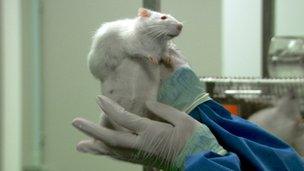French GM-fed rat study triggers furore
- Published

A furious row has erupted over a French study claiming to have found tumours and other problems in rats fed on genetically modified maize and exposed to a common, associated herbicide.
The rodents ate the GM diet over a two-year period - a normal lifetime.
The study's length made its results far more reliable than previous research, said team-leader Gilles-Eric Seralini.
But independent scientists criticised the work for its statistical methods and for using the wrong type of rat.
They said the albino Sprague-Dawley strain of animal had a tendency to develop cancers, especially the mammary tumours seen in some of the study subjects.
A paper detailing the investigation has been published in the peer-reviewed journal Food and Chemical Toxicology.
Different diets
It describes how groups of rodents were given a diet that included the engineered maize known as NK603.
This is a product of the big agrochemical business Monsanto, which has modified the genetics of the plant so that it can resist the company's herbicide Roundup. The biotech innovation has allowed farmers to spray their fields and kill off weeds without harming the crop.
Prof Seralini and colleagues examined 200 rats in their research.
Some ate engineered maize sprayed with Roundup; some ate just the GM maize with no herbicide present; and a third group consumed no GM material but had traces of Roundup introduced into their drinking water. A fourth group acted as the control, and ingested a non-GM maize and non-tainted water.
The two-year study length was designed to match the expected lifetime of a standard rat - far longer than the usual 90-day trials conducted by industry, the team said.
The French scientists found that the rats fed on a diet containing the herbicide-tolerant GM maize, or given water containing Roundup considered safe in drinking water and GM crops in the US, died sooner than the rats fed just the standard diet.
Fifty percent of males and 70% of females died prematurely, compared with only 30% and 20% in the control group.
Study fallout
The researchers also described late-developing, large mammary tumours and severe liver and kidney damage. The tumours, although not metastasizing (spreading to other parts of the body) were said to be big enough to impede organ function in the affected rats.
Prof Seralini said the results showed that genetic modification needed to be studied far more carefully than at present and over far longer timescales.
"I think these are very important findings," commented Dr Michael Antoniou, a molecular biologist at Kings College, London, who acted as an adviser to Seralini's team.
"At the very least, what this study highlights is: firstly, the need to test all GM crops in two-year, lifelong studies; and, secondly, when looking at testing the toxicity of herbicides/pesticides, we need to test the full agricultural formulation and not just the active ingredient."
The latter remark is a reference to earlier studies which tested only the glyphosate component of Roundup in trials, as opposed to the complete commercial product used in the French study.
But the publication of the work has met a barrage of criticism by other researchers, who have taken issue with the statistical methods employed in the paper.
Media restriction
They also questioned the choice of rat, which they said was well known to develop cancers, particularly if its diet was not well controlled. In addition, the small size of the control group - just 20 animals - made it difficult to draw any conclusions of significance, they argued.
And there was disapproval of the emotive way in which some of the results were presented in the paper, specifically pictures of rats with large tumours.
"The most evocative part of the paper is those pictures of tumorigenesis," said Prof Maurice Moloney from Rothamsted Research, where much UK GM study is undertaken.
"They give the impression that this never happens in controls. I'd be surprised if it didn't, but that ought to be explicitly demonstrated, and if there was a control that ended up showing similar kinds of tumorigenesis then a picture of that rat should be shown as well, just so we can see if there are any qualitative differences between them."
In a move regarded as unusual by the media, the French research group refused to provide copies of the journal paper to reporters in advance of its publication, unless they signed non-disclosure agreements. The NDAs would have prevented the journalists from approaching third-party researchers for comment.
In the event, French media broke the 1300 GMT embargo and ran stories early on Wednesday morning.
Jonathan.Amos-INTERNET@bbc.co.uk and follow me on Twitter: @BBCAmos
- Published19 September 2012
- Published4 September 2012
- Published28 August 2012
- Published2 May 2012